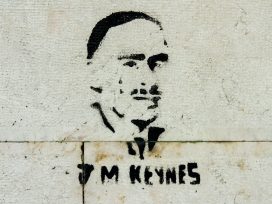
The debate between Keynes and Hayek must be between a historically accurate Hayek and a historically accurate Keynes. Only then can the differences – and the common ground – between these two key economists of the mid-20th century be understood.
When it comes to the economy, the moral leadership Obama promised is conspicuously lacking. Will the US president and his economic advisors be willing to regulate a financial sector to which, for some, they are worryingly close?
Obama supporters are beginning to get restless.
Sitting the other day in a restaurant with a friend – a woman of strong opinions who’d been ready to lay down her life for Obama during the campaign – I asked her how she was feeling these days. “Depressed. He isn’t fulfilling his promises. He’s arguing from positions of compromise rather than stating what he really believes. He’s in Wall Street’s pocket.”
I wondered whether she might give him a little more time.
Sitting at the next table, another woman of strong opinions piped up. “No, she’s right. He’s trying to please everybody. He’s got to fight harder.”
Her companion put his two cents in. “Naw, he’s right. Give him more time.”
After the first ecstatic flush of Obama’s election, it’s clear that we’re in the summer doldrums. Despite the administration’s stimulus packages, unemployment rates are creeping up, mortgages are being foreclosed at a rate 22 per cent higher than last year, and the press no longer chirps about the “recovery” taking months rather than years. It isn’t exactly that people are angry about Obama’s performance, but rather that there’s a sense of disappointment that the moral leadership on issues like the economy or Guantanamo or wiretapping that Obama’s supporters had hoped for hasn’t materialized, and the aloofness that one sensed in the President’s character persists or has even increased as his job gets harder.
One of the really disturbing bits of news is that the investment bankers seem to be doing just fine. In the past few days the press has reported that for the last three months the profits of JP Morgan Chase Bank and Goldman Sachs, two of Wall Street’s major investment banks, were up to $2.7 billion and $3.4 billion respectively, and that the average Goldman employee stands to make at least $770 000 by the end of 2009.
Bolstered by free money and low interest loans from the government, the investment banks made this money in their usual risk-taking way. The New York Times reports that Goldman’s “value to risk” quotient, which measures how much a firm can lose in a single day, increased by 20 per cent in the first quarter of the year, and that figure is likely to remain high. The shares in both companies, which make up a large part of the employee bonuses, have skyrocketed since the beginning of the year.
Though it’s a wild exaggeration to say that Obama is in Wall Street’s “pocket” – he’s a much too intelligent person to be in anybody’s pocket but his own – certain blood lines in his administration may give even ardent supporters sleepless nights. His two top economic advisers, Lawrence Summers and Timothy Geithner, were nurtured by Robert Rubin, who worked at Goldman Sachs for 25 years and ran it for four. An immensely influential figure, Rubin was Secretary of the Treasury under Clinton and remains an unofficial “long-time advisor” to Obama. Henry Paulson, Bush’s Treasury Secretary, also worked for and was CEO for four years of, you guessed it, Goldman Sachs.
The same Goldman Sachs whose employees are getting richer and richer while the economy remains in the doldrums.
Maybe the most worrisome thing isn’t whether these guys have conspired to reward the banking industry for its misdeeds. Like Obama, they’re bright, super-educated pragmatists whose style couldn’t be farther removed from shady deals in smoke-filled political backrooms. But one has to wonder exactly how ready they are to regulate the practices that they themselves created.
For that’s the battle that is shaping up.
In June President Obama and Tim Geithner published an 89 page document that the President promised was “a sweeping overhaul of the financial regulatory system” on a scale not seen since the Depression. After being discussed in the press for only one day, it went directly to the committees of Congress, whose only purpose these days seems to be to get its members re-elected. At some point in the fall, Obama’s proposal will turn up as an even- longer proposal to be debated until some watered-down version is put to a vote.
So far the greatest strength (and weakness) of the proposal is that nobody likes it. Conservatives said that it would create too much regulation, the Left that it wouldn’t create nearly enough. To foolishly sum up 89 pages in one sentence, the proposal did give the government more oversight powers, but didn’t offer any way to keep an eye on the madly complex “derivatives” that banks all over the world gamble with.
In this case, the details may not be as telling as the proposal’s generally bland tone. What it lacked – and what angered those women of strong opinion in the restaurant – was a point of view, a vision of how things ought to be, the economic version of the moral leadership that people are thirsting for.
There’s no doubt that the new President has set a different tone in the White House, and over the world – an air of intelligence and thoughtful analysis of complex situations. In terms of eradicating hundreds of years of racial prejudice, his presence is invaluable. And it’s also true that to judge him after so few months may be a product of impatience rather than sensible thinking. The fact that his approval ratings have dropped in the last month may even have a good side: rather than expecting him to be a half-black Jesus, the public is judging him by the same standards that any President would have to face.
Nevertheless, one feels that something is missing. To come close to the promise of his candidacy, Obama is going to have to do what Franklin Delano Roosevelt did during the Depression – bite the hand that feeds him, in this case the manicured hands of Wall Street “experts” who contributed large sums of money to get him elected. Otherwise, given the lust for speculation that still infects the financial markets, we may be in for an even more serious crash not many years down the line.
New York, 18 July
Published 24 July 2009
Original in English
First published by Eurozine
© George Blecher / Eurozine
PDF/PRINTSubscribe to know what’s worth thinking about.

The debate between Keynes and Hayek must be between a historically accurate Hayek and a historically accurate Keynes. Only then can the differences – and the common ground – between these two key economists of the mid-20th century be understood.

How do tourists experience life in places that they make unliveable? Discussing overtourism on this episode of the Standard Time talk show with a Mallorcan activist, a Central European architect and an English marketing expert.